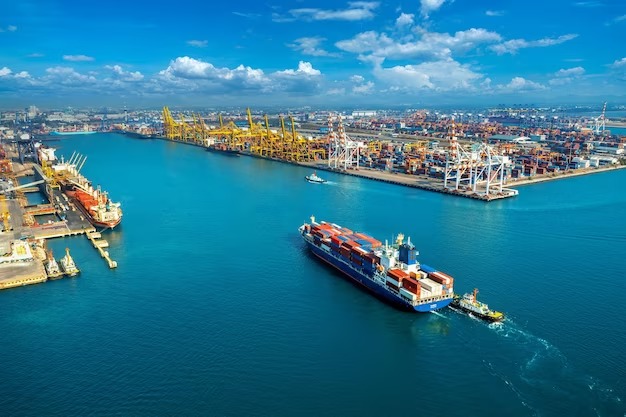The Future of Global Trade: Navigating Geopolitical Uncertainties

In a world that’s becoming increasingly interconnected, global trade is the lifeblood of economies worldwide. The exchange of goods and services across borders has been a driving force behind economic growth, technological progress, and improved living standards.
However, as we step into the future, navigating the complex web of geopolitical uncertainties becomes paramount. In this article, we’ll explore the challenges and opportunities that lie ahead in the world of global trade and how businesses and nations can adapt to this shifting landscape.
The Geopolitical Chessboard
Global trade is no longer a simple game of supply and demand; it’s now entangled with geopolitical tensions and shifting power dynamics. The United States and China, two economic giants, are engaged in a trade war that has sent shockwaves throughout the global economy. This ongoing dispute, marked by tariffs and retaliatory measures, serves as a stark reminder that geopolitical tensions can significantly impact trade flows.
Protectionism vs. Globalization
The balance between protectionism and globalization is a tug of war that shapes the future of global trade. Protectionist policies, which prioritize domestic industries and jobs, often lead to barriers such as tariffs and trade restrictions. On the other hand, globalization promotes the free flow of goods, capital, and information across borders, fostering innovation and economic growth.
The COVID-19 pandemic has further complicated this debate. Governments worldwide scrambled to secure essential supplies, leading to export restrictions and disruptions in global supply chains. This crisis exposed vulnerabilities in the current system, prompting questions about the future of globalization.
The Rise of Regional Trade Blocs
Amidst these uncertainties, regional trade blocs are gaining prominence. The European Union, for instance, continues to deepen its integration, creating the largest single market in the world. In Asia, the Comprehensive and Progressive Agreement for Trans-Pacific Partnership (CPTPP) is becoming a significant force, while the Regional Comprehensive Economic Partnership (RCEP) unites nations in the Asia-Pacific region.
Regional trade agreements offer a degree of stability in an otherwise turbulent global trade landscape. They can serve as a lifeline for businesses seeking to minimize risks associated with geopolitical tensions.
Technology: A Double-Edged Sword
Advancements in technology are reshaping the future of global trade. E-commerce, automation, and digital platforms have revolutionized the way businesses engage in international commerce. These tools have made it easier for small and medium-sized enterprises (SMEs) to participate in global trade, reducing barriers to entry.
However, technology also poses challenges. The digital economy brings cybersecurity risks and concerns over data privacy. Moreover, the digital divide remains a significant hurdle, with many nations and communities lacking access to the internet and digital tools.
Sustainable Trade Practices
Sustainability is no longer a buzzword but a critical factor in the future of global trade. Climate change, deforestation, and environmental degradation are global challenges that cannot be ignored. Consumers are increasingly conscious of the environmental and social impact of their purchases, leading to a growing demand for sustainable products.
As a result, businesses are under pressure to adopt environmentally friendly practices throughout their supply chains. From renewable energy sources to ethical labor practices, sustainability is becoming a key driver of competitiveness in the global marketplace.
The Role of Multilateral Organizations
Multilateral organizations like the World Trade Organization (WTO) play a vital role in shaping the future of global trade. The WTO provides a forum for negotiations, dispute resolution, and the promotion of a rules-based trading system.
However, the WTO faces challenges, including a backlog of unresolved disputes and a lack of consensus on key issues. The organization’s relevance and effectiveness in addressing contemporary trade challenges are being questioned. The future may require reforms and adaptations to better address the needs of a changing global trade landscape.
Navigating Geopolitical Uncertainties: Strategies for Businesses and Nations
As we look ahead, both businesses and nations must proactively navigate the complexities of global trade. Here are some strategies to consider:
Diversify Supply Chains: Overreliance on a single source can be risky. Diversifying supply chains across regions and suppliers can help mitigate disruptions caused by geopolitical tensions or other unforeseen events.
Invest in Technology and Innovation: Embrace digital tools and automation to enhance efficiency and resilience. Innovation can drive competitiveness and open new markets.
Sustainability Integration: Incorporate sustainable practices into your business model. From reducing carbon emissions to promoting fair labor practices, sustainability can be a competitive advantage.
Engage in Regional Trade Blocs: Consider participating in regional trade agreements to access stable markets and reduce geopolitical risks.
Advocate for Multilateralism: Businesses and nations should actively support multilateral organizations like the WTO and work towards reforms that strengthen their effectiveness.
Summary –
The future of global trade is fraught with geopolitical uncertainties, but it also holds immense potential for growth and prosperity. Businesses and nations that adapt to this changing landscape by embracing technology, sustainability, and a diversified approach to trade will be better equipped to thrive in the years to come.
As we navigate the geopolitical chessboard, it’s essential to remember that cooperation and dialogue can lead to solutions that benefit all stakeholders in the global trade ecosystem.






